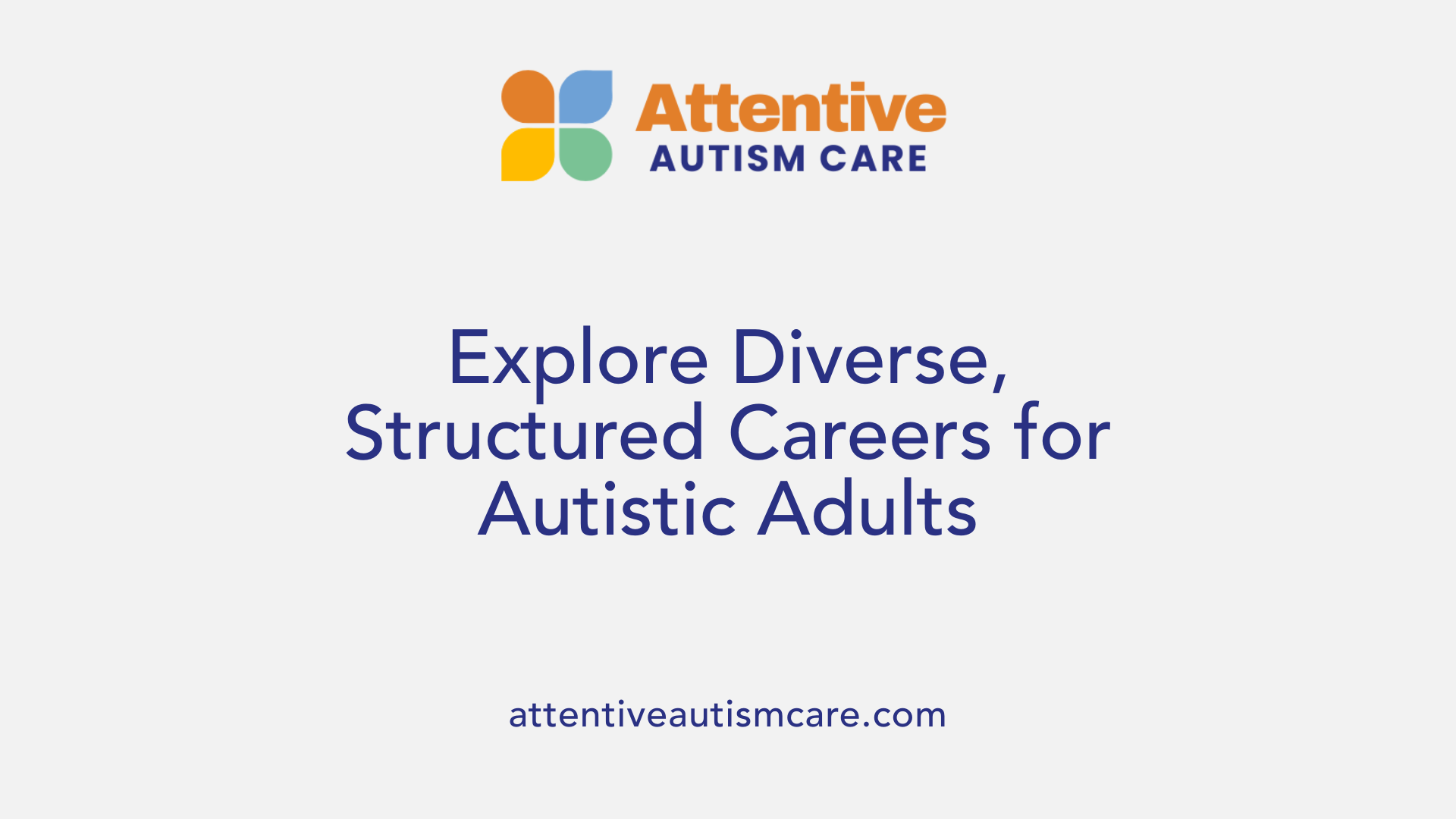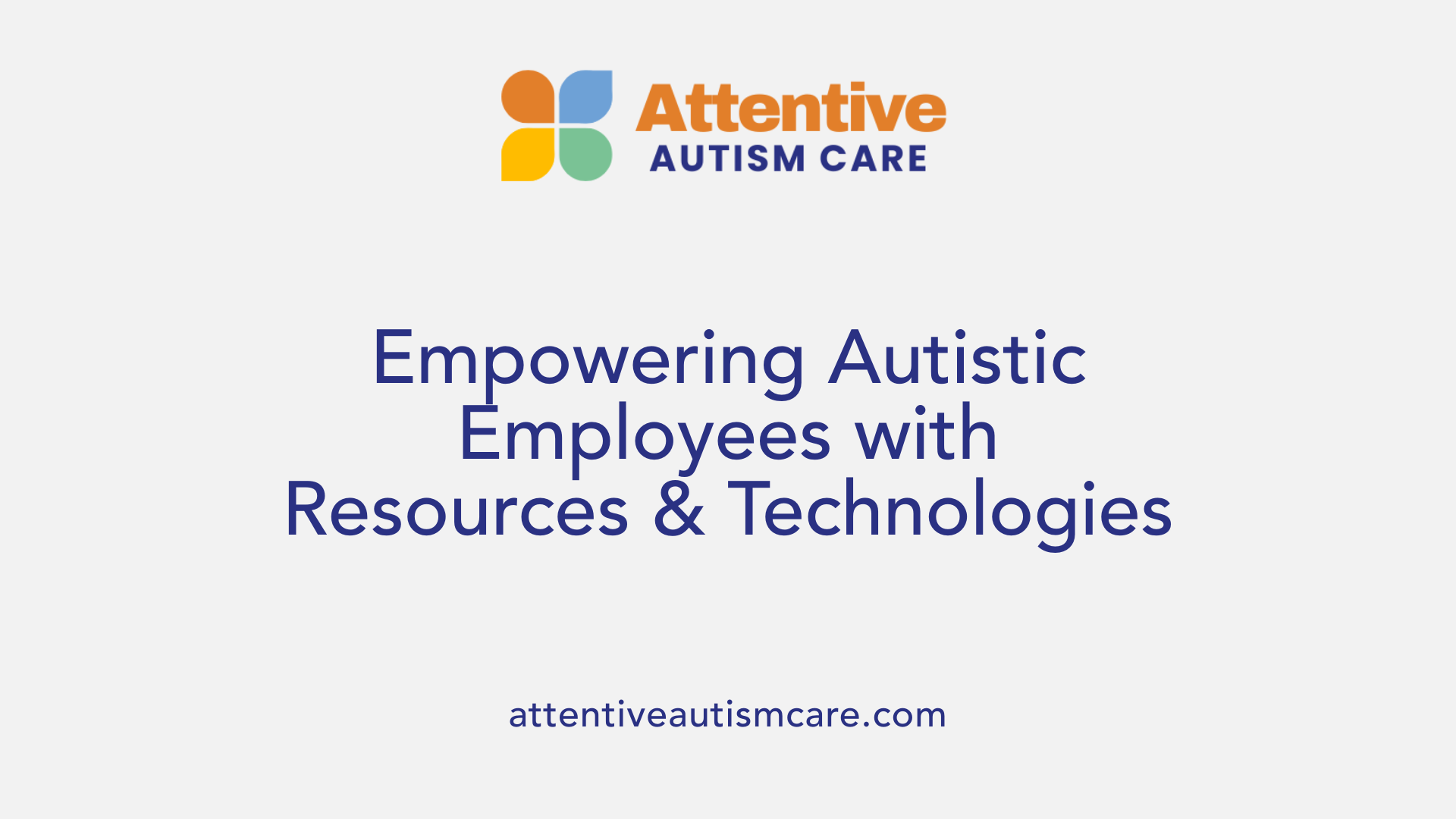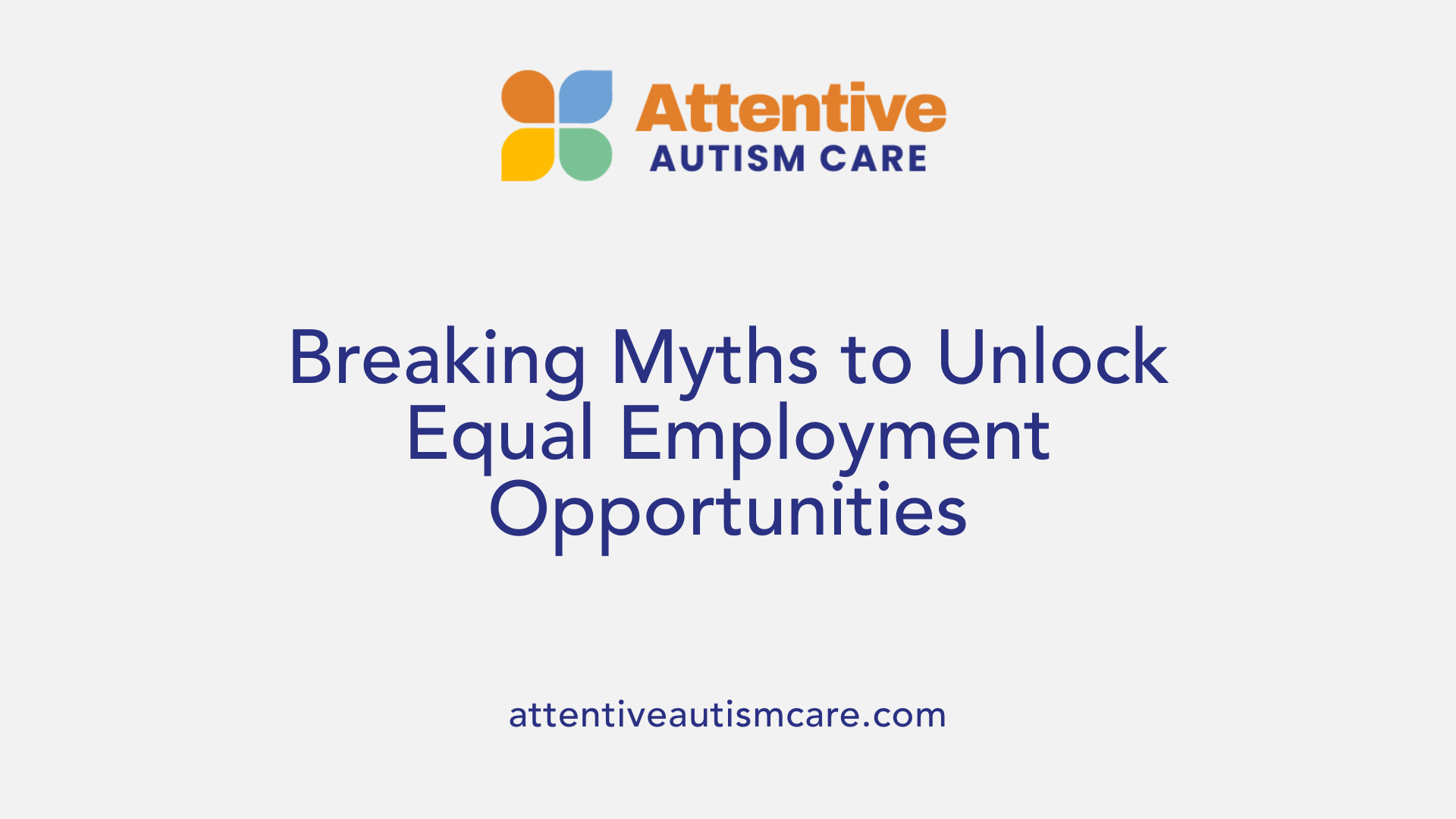Supporting Autistic Adults in Job Retention
Creating Inclusive Work Environments for Long-Term Success

Understanding the Employment Landscape for Autistic Adults
Despite having the necessary skills and abilities, many autistic adults face high unemployment and underemployment rates. Factors such as societal misconceptions, workplace stigma, sensory sensitivities, and insufficient support systems contribute to these challenges. Addressing these barriers involves a multi-faceted approach focusing on tailored accommodations, natural supports, and inclusive policies that foster job retention and fulfillment.
Job Types Suitable for Autistic Adults
 Many employment opportunities are well-suited for autistic adults, particularly those that provide predictability, routine, and minimal social interaction. These roles enable individuals to leverage their strengths and reduce stress related to sensory sensitivities or social challenges.
Many employment opportunities are well-suited for autistic adults, particularly those that provide predictability, routine, and minimal social interaction. These roles enable individuals to leverage their strengths and reduce stress related to sensory sensitivities or social challenges.
Examples of suitable jobs include data entry, proofreading, and remote content moderation. These roles typically involve structured tasks with clear instructions, allowing autistic employees to work independently without frequent social demands or unpredictable workplace situations.
Careers in technology fields also offer promising options. Positions such as IT support, cybersecurity analyst, software tester, and data manager are valued for their logical structure, predictable workflow, and clarity in expectations. These roles often promote focus, attention to detail, and problem-solving skills—areas where many autistic adults excel.
Skilled trades can also provide fulfilling employment. Jobs like manufacturing, plumbing, electrical work, and welding involve hands-on work following established procedures. Such careers often have clear routines and tangible outcomes, making them accessible and rewarding.
Furthermore, roles in archiving, librarianship, financial analysis, and scientific research tap into the abilities of autistic adults to recognize patterns, concentrate intensively, and perform precise work. These positions can be both meaningful and well-aligned with their capabilities.
Overall, the diversity of suitable job types highlights the importance of matching individual skills and preferences with structured, low-stress roles. Creating work environments that adapt to these needs helps foster inclusion and promotes long-term employment success.
Additional resources and strategies include exploring community-based employment programs, vocational rehabilitation initiatives, and targeted employer support. These efforts can open up more opportunities for autistic adults to find meaningful and sustainable employment.
Resources and Tools to Support Autistic Employees

What resources and tools are available to assist autistic employees in the workplace?
Support for autistic workers can be significantly improved through a variety of targeted resources and practical tools. These include specialized training programs, employment support services, and assistive technologies designed to meet communication, sensory, and organizational needs.
Organizations like Milestones Autism Resources offer professional consultations, training sessions, and workplace strategies. They provide guidance on how to create sensory-friendly environments, implement accommodations, and foster inclusive workplace cultures. Similarly, the U.S. Department of Employment and programs such as the Employee Assistance and Resource Network on Disability Inclusion (EARN) and the Job Accommodation Network (JAN) deliver comprehensive toolkits, webinars, and guidance materials. These resources assist employers in understanding legal obligations under laws like the ADA, designing reasonable accommodations, and promoting best practices for inclusion.
Industry-specific initiatives also play a vital role. For example, SAP’s Autism@Work initiative offers structured frameworks, awareness campaigns, and support systems to facilitate effective employment integration. The Autism in the Workplace program by the Simons Foundation, launched in 2017, emphasizes inclusive hiring, internship opportunities, and ongoing mentorship, creating models that can be replicated across sectors.
Assistive technologies are also crucial. Tools like Texthelp’s Read&Write for Work help employees overcome literacy challenges, improve focus, and increase productivity. Environmental modifications, including sensory-friendly workspaces, noise-canceling devices, and flexible work hours, can reduce overstimulation and enhance comfort.
Additionally, resources such as the Autism Speaks’ employment toolkit and the Neurodiversity@Work Playbook provide practical advice on communication strategies, managing sensory sensitivities, and fostering social inclusion. They advocate for mentorship programs, structured onboarding, and ongoing professional development.
Combining these resources—training programs, assistive technologies, tailored accommodations, and mentorship—creates a supportive environment where autistic individuals can thrive. Overall, ensuring access to these tools and guidance is essential to improve employment experiences and retention for autistic employees.
Creating Inclusive Workplaces: Best Practices and Accommodations

What are best practices and accommodations for creating inclusive workplaces for autistic employees?
Building an inclusive work environment for autistic adults requires a combination of awareness, flexibility, and thoughtful design. Employers can start by educating staff about autism to foster understanding and reduce stereotypes. Training programs aimed at increasing workplace awareness help colleagues appreciate the unique strengths and challenges faced by autistic employees.
Environmental modifications play a crucial role in supporting neurodiverse workers. Sensory-friendly spaces, such as quiet rooms or designated areas with appropriate lighting and noise levels, help employees manage overstimulation. Flexible work arrangements—like adjustable schedules, options for remote work, and Breaks—can also accommodate sensory sensitivities and promote comfort.
Providing tailored accommodations is essential. Clear communication strategies, structured tasks, visual supports, and assistive technologies—such as speech-to-text software or sensory equipment—can significantly enhance job performance. For instance, offering visual cues for deadlines or using noise-canceling headphones can reduce sensory overload.
Encouraging voluntary disclosure of autism can be beneficial. When employees choose to share their diagnosis, it allows the employer to provide necessary supports and accommodations. This process should be handled with sensitivity, emphasizing privacy and non-stigmatization.
From a legal perspective, laws like the Americans with Disabilities Act (ADA) mandate that employers provide reasonable accommodations to support workers with disabilities, including autism. Engaging in an interactive dialogue with the employee helps identify effective solutions that meet individual needs.
In addition to individualized supports, universal design principles—creating workplaces that are accessible and welcoming for everyone—are vital. Natural supports like mentoring programs, routine schedules, and social inclusion activities foster a sense of belonging.
Overall, adopting these best practices and accommodations cultivates a workplace culture rooted in acceptance, respect, and support. This approach not only benefits autistic employees through increased job satisfaction and retention but also enriches the organization with diverse perspectives and skills.
Supporting Autistic Adults in Maintaining Employment

What are effective methods and strategies for supporting autistic adults in maintaining employment?
Supporting autistic adults in staying employed involves multiple tailored strategies that recognize their unique strengths and challenges. A core aspect is providing individualized workplace accommodations that can include sensory-friendly environments, flexible work hours, and clear communication protocols. These adjustments help reduce overstimulation and manage sensory sensitivities.
Job matching is also essential. Employers should focus on aligning roles with an individual's strengths such as attention to detail, reliability, and pattern recognition. For example, positions in data entry, quality control, or IT support often benefit from these traits. This personalized approach enhances job satisfaction and performance.
An ongoing support system is critical for long-term success. Regular coaching, mentorship, and mental health resources help address work-related stress, improve social skills, and build confidence. Natural supports—like coworkers inviting colleagues to social events or supervisors conducting regular check-ins—foster social inclusion and help integrate autistic employees into the team.
Training programs aimed at increasing awareness about neurodiversity can also improve the workplace environment. Organizations such as the Autism Society or the U.S. Department of Labor provide resources and guidelines that assist companies in developing inclusive practices.
Creating a workplace culture that values diversity and encourages understanding is fundamental. This includes educating all employees on autism and establishing policies that support long-term employment, rather than just short-term hiring goals. Employers committed to these practices observe higher retention rates and more fulfilling work experiences for autistic adults.
By combining personalized adjustments, strengths-based job placement, ongoing mentorship, and an inclusive workplace culture, organizations can significantly improve employment stability for autistic adults, allowing them to thrive professionally and socially.
Challenges and Success Factors in Employment for Autistic Adults
What are common challenges faced by autistic adults in maintaining employment, and what factors influence employment success?
Autistic adults encounter multiple hurdles that can impact their ability to find and keep jobs. Common challenges include difficulties with social communication, such as interpreting social cues and engaging appropriately in workplace interactions. Sensory sensitivities, like hypersensitivity to noise, lights, or textures, can make typical work environments overwhelming, leading to stress and discomfort.
Many autistic individuals also face executive functioning challenges, which affect planning, organization, and time management—skills crucial for daily work tasks. Workplace stigmas and misconceptions about autism often create barriers, causing discrimination or misunderstanding from colleagues and supervisors.
Despite these obstacles, various factors can foster employment success. Tailored accommodations, such as sensory-friendly workspaces, flexible schedules, and clear instructions, help autistic employees perform at their best. Supportive managers and inclusive workplace cultures that emphasize acceptance and understanding significantly improve retention.
Environmental modifications—like quiet rooms, noise-canceling headphones, and predictable routines—aid in reducing sensory overload. Broader systemic efforts, including effective community employment programs and targeted employer training, are vital to increase opportunities and sustained employment for autistic adults.
Focusing on individual strengths, such as attention to detail, reliability, and creative problem-solving, along with societal attitude shifts and supportive ecosystems, enhances job stability. Ultimately, creating workplaces that adapt to and embrace neurodiversity promotes not only employment success but also improves overall well-being and quality of life for autistic adults.
Beyond Accommodations: Building Supportive Environments for Long-Term Job Retention
How can workplaces support autistic adults in job retention beyond accommodations?
Supporting autistic adults in maintaining long-term employment involves more than just providing physical or sensory accommodations. It requires fostering an environment where natural supports and social inclusion thrive.
Workplaces can initiate inclusive orientation programs where new autistic employees are welcomed with additional support, helping them navigate social and organizational norms. Regular check-in meetings, conducted by supervisors or employment support professionals, can provide ongoing feedback and address emerging needs.
Promoting social inclusion through informal activities like coffee hours, team lunches, or invitation to workplace events encourages peer relationships and reduces social isolation. These social invitations help autistic employees feel more socially connected, which contributes to job satisfaction and overall well-being.
Building a positive workplace culture is central to long-term retention. This includes continuous education and awareness efforts aimed at dismantling stereotypes about autism. When all staff members understand neurodiversity, it fosters acceptance and appreciation of diverse working styles.
Employers should create a space where open communication about support needs is normalized. Encouraging autistic employees to share their preferences and challenges without fear of stigma promotes tailored support strategies. Engaging with external employment support programs or mental health resources can also provide additional layers of support.
Mentorship programs pairing autistic employees with understanding colleagues or professionals can facilitate social integration and skill development. Opportunities for social interactions, both formal and informal, help build a sense of belonging.
Furthermore, companies can participate in community engagement initiatives. These programs promote systemic change by influencing broader employment practices and policies, emphasizing inclusivity at the societal level.
Together, these strategies help create an organizational culture that values neurodiversity, promotes social cohesion, and ensures that support for autistic employees extends beyond mere accommodations, encouraging their growth, satisfaction, and retention in the workforce.
| Strategy | Description | Benefit |
|---|---|---|
| Inclusive orientation | Extra support during onboarding | Smoother transition and reduced anxiety |
| Regular check-ins | Continual support from supervisors | Early problem detection and relationship building |
| Social invitations | Inviting employees to social events | Promotes connections and reduces isolation |
| Workplace education | Ongoing awareness programs | Fosters understanding and acceptance |
| Open communication | Encouraging sharing of needs | Provides tailored support and reduces stigma |
| Community engagement | Participating in broader inclusion initiatives | Systemic change and societal support |
This approach highlights the importance of nurturing a workplace atmosphere that values social bonds and understanding, ultimately supporting autistic adults in achieving sustained employment and professional fulfillment.
Addressing Misconceptions and Advocating for Equal Employment Opportunities

How can misconceptions about autism affect employment opportunities for autistic adults?
Misconceptions about autism play a significant role in limiting employment chances for autistic adults. Many employers harbor stereotypes, such as believing that autistic individuals are unable to adapt to workplace social norms or lack the necessary skills for various roles. These misunderstandings often lead to discrimination, whether through biases in hiring decisions or hesitations about providing appropriate accommodations.
Such misconceptions also foster barriers because they influence employer attitudes and policies. When employers underestimate an autistic person’s potential or focus solely on challenges rather than strengths, they may overlook talented candidates or fail to create an inclusive environment.
Furthermore, stigma and fears of negative judgments discourage many autistic adults from disclosing their diagnosis. Without disclosure, they miss out on accommodations like sensory adjustments, flexible hours, or supportive communication strategies that could improve their work experience.
Raising awareness through advocacy campaigns and education is essential. Providing training to employers about autism and emphasizing the diverse skills and qualities that autistic workers bring — such as focus, attention to detail, and honesty — can lead to more equitable hiring practices. Promoting understanding and acceptance ultimately supports autistic adults in obtaining and maintaining meaningful employment.
By addressing these misconceptions, organizations can foster workplace cultures that value neurodiversity, remove unnecessary barriers, and unlock the full potential of autistic employees. This shift not only benefits individuals but also enhances workforce innovation and productivity.
Fostering a Society of Inclusion and Respect
Improving employment retention for autistic adults hinges on collective efforts across workplaces, communities, and policymakers. By embracing neurodiversity, implementing inclusive practices, and challenging misconceptions, society can unlock the full potential of autistic individuals. Success stories and evidence-based strategies demonstrate that with the right support, accommodations, and an accepting culture, autistic adults can thrive professionally, leading to richer, more diverse workplaces and communities. Continued advocacy, policy development, and community support are essential in creating environments where autistic adults not only find jobs but maintain fulfilling, long-term careers that honor their strengths and promote overall well-being.
References
- Employment Resources for Autism | IACC
- Employment Natural Supports: What are they and ... - Autism Society
- Supporting Autistic Employees | Milestones Autism Resources
- Critical Reflections on Employment Among Autistic Adults - PMC
- Employment | Autism Society
- Employment Resources for Autism - Websites and Program | IACC
- Supporting employees with autism in the workplace - Texthelp




































































































